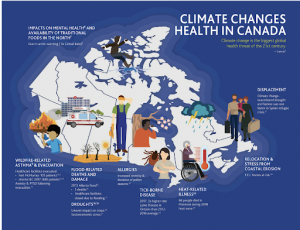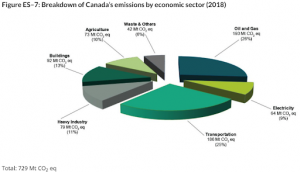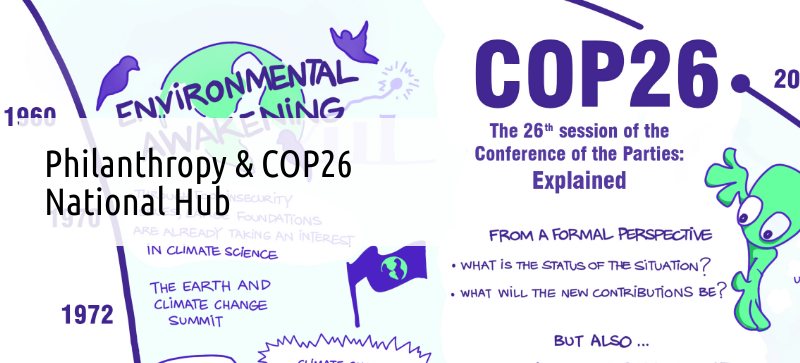
Annie Bérubé is a program director at the McConnell Foundation, focusing on granting and partnerships in climate. Annie is an economist (BA McGill, MES York University) and has spent most of her career as an economist and policy analyst with Environment Canada and Health Canada. She has also worked at Smart Prosperity at the University of Ottawa and has a director of government relations with Équiterre.
Canadian philanthropy and the climate crisis: What can you do?
Climate change is an emergency that requires immediate action from all sectors of Canadian society, including philanthropy. And yet, ClimateWorks estimates that less than 2% of global philanthropic giving is dedicated to climate mitigation. [1] For foundations in Canada, there are many opportunities to engage in supporting organizations that are tackling the climate crisis head-on, and resources and networks to support this form of engagement are available.
Last August, amidst record-breaking wildfires across the globe and a deadly heatwave in British Columbia, the UN Intergovernmental Panel on Climate Change (IPCC) issued its annual report, described by Bloomberg as “Code Red for Humanity.” IPCC scientists are now observing changes in the Earth’s climate in every region and across the whole climate system. IPCC scientists found that unless there are immediate, rapid and large-scale reductions in greenhouse gas (GHG) emissions, limiting warming to close to 1.5°C or even 2°C will soon be beyond reach.
Some parts of the globe will be more impacted by the changing climate. Canada is actually warming at double the global average. [2] Thus, even in a 2°C global warming scenario, Canada is predicted to warm by 4°C on average by the end of the century, with the North warming by double that. [3]
The International Philanthropy Commitment on Climate Change calls on all foundations, “regardless of their mission, status, or geographic location, to come together and signal their commitment to climate action.” The McConnell Foundation supports the commitment and other Canadian foundations are signing on as well. Foundations in Canada have a crucial role to play, and the urgency to engage could not be greater.
The Climate Crisis in Canada
Canada is already experiencing the impacts of climate change. We regularly see stories in the media about wildfires and flooding devastating communities and impacting tourism-dependent local economies, [4] insect infestations and droughts hurting our farmers, [5] warm oceans hurting salmon runs, and fishers being driven to apply for federal aid. [6] Canada’s infrastructure isn’t built for the climate crisis. According to the Institute for Climate Choices, the roads, bridges, drinking water systems and power lines we have built, and continue to build, are made for a world that no longer exists. Some estimates put the cost of bringing infrastructure up to an acceptable standard across the country at over $250 billion. [7] The Lancet Countdown on Health and Climate Change exposed how the impacts of climate change could soon overwhelm the Canadian health care system, resulting in the Canadian Medical Association calling climate change the public health imperative of our time. [8] Climate change affects mental health as well, which can be especially difficult for young people who are concerned about the future. The American Psychological Association has identified “eco-anxiety” as “a chronic fear of environmental doom,” which can be debilitating, emotionally exhausting and can lead to depression.

Source: The Lancet Countdown on Health and Climate Change, 2019. Policy Brief for Canada. https://storage.googleapis.com/lancet-countdown/2019/11/Lancet-Countdown-Policy-Brief-Canada_FRANCAIS_FINAL.pdf
On a more hopeful note, climate science denialism seems to be fading. But in the face of this climate emergency, defeatism, apathy and incrementalism all pose a challenge to achieving the ambitious work that needs to be done. And this applies to philanthropy too. The Canadian philanthropic response to the climate crisis has been modest to date. Considering the scale of the emergency we now face, one must ask: what do we need to do to move more philanthropic contributions to address the existential crisis of our times?
Canada’s carbon pollution
Canada’s GHG emissions have increased steadily since 2009, reaching 730 megatonnes of carbon dioxide equivalent (Mt CO2 eq) [9] in 2019. Under the Paris Agreement, Canada recently submitted a revised climate target aiming to reduce GHG emissions by at least 40% to 45% below 2005 levels (by 2030) and to achieve a net-zero carbon economy by 2050. Reaching net-zero emissions by 2050 will require a steep and rapid decline in GHG emissions, starting now.
Canada’s economy is one of the most carbon intensive in the world, with the third highest per-capita carbon emissions. [10] The International Energy Agency just published a road map to net zero by 2050 for the global energy sector and concluded that “beyond projects already committed as of 2021, there are no new oil and gas fields approved for development in our pathway, and no new coal mines or mine extensions are required. Net zero means a huge decline in the use of fossil fuels.”[11] For Canada this means 83% of our remaining oil reserves are “unextractable” if the world is to remain below 1.5C. [12] This has major implications for banks and pension plans who are heavily invested in this sector, and for the labour force employed in those sectors.
As an oil and gas producer and exporter, Canada has a unique obligation to the world as well as an opportunity to showcase how to transition rapidly and equitably to a net zero carbon economy. And philanthropy needs to play a role in that.
The Role of Philanthropy
“Philanthropy alone cannot end the climate crisis, but it can play an essential role in catalyzing the trillions of dollars of public sector and private sector funding needed to transition toward a low-carbon global economy.” [13]
According to the Institute for Sustainable Finance, in Canada, total private and public capital investments needed to meet our 2030 target are estimated at $128billion over the next ten years (that means $1,28billion per year for the next decade). [14] The Canadian Expert Panel on Sustainable Finance identified 9 recommendations to spur the essential market activities, behaviours and structures needed to bring sustainable finance into the mainstream. Many Canadian think tanks, not-for-profits, research organizations and charitable organizations are actively working to address these barriers to sustainable finance, but they need resources to continue to do so. Philanthropic funding to these organizations can help unlock the billions of dollars to decarbonize our economy.
The last year has seen a flurry of ‘net-zero carbon’ commitments by corporations, investors, banks, asset managers (and even from Canadian oil sands producers). [15] What does it mean to commit to net-zero carbon? Fortunately, there are science-based net zero targets designed for corporations, [16] and other global gold standards to judge these commitments by. And it is often non-profit organizations who have the expertise to provide independent, credible assessments of these commitments and sort through the greenwashing. These non-profit organizations also support and engage with corporations and investors to drive ambitious and credible net-zero carbon commitments, through shareholder activism and other means. And they rely on philanthropic resources to do so.
Thanks to previous research and experimentation we now have the knowledge we need to achieve the deep and rapid emissions reduction needed in most economic sectors in Canada. In its report Canada’s Net Zero Future, the Climate Choices Institute identifies “safe bets” as readily available emission-reducing technologies and solutions that are commercially available and face no major constraints to widespread implementation. Those technologies could generate most of the emissions reductions by 2030 across all scenarios. Non-technological solutions include increased transit ridership, active transportation infrastructure, carbon sequestration in agricultural soils, nature-based climate solutions, 15-minute neighbourhoods and housing densification. There are no silver bullets needed, the solutions are there.
Addressing the climate crisis will require the transformation of our fossil fuel dependent economy. To do so requires building and maintaining a broad movement of engaged citizens and organizers to push for ambitious climate policies and investments at the local, provincial and national level. These are all strategies in the wheelhouse of philanthropy. This is our sweet spot. Philanthropic funding can make a meaningful contribution to addressing the remaining systemic barriers to implementing known climate solutions at the speed and scale required to ensure a safe climate.
Climate funding at the McConnell Foundation
The McConnell Foundation made a strategic decision in 2021 to make climate action a core focus area for our funding and partnerships. Here are some of the steps we have taken on this journey and what we are learning from our partners and the experts in this field:
1- Increasing our annual funding to scale climate solutions [17]
2021 will mark the year of our highest disbursements to climate organizations and projects (totalling $4.5M in new funding). Our partners currently advance solutions to decarbonize steel, cement and mining, aggregate and finance deep energy retrofits in residential and commercial buildings, build the energy efficiency labour force in Canada, engage with pension beneficiaries to decarbonize retirement savings, give financial resources and support to youth climate activists, provide climate governance training to boards of directors, support Indigenous climate leaders and more. You can learn more about our partners here. And we rarely do this alone, there are climate funders collaboratives [18] you too can join to leverage your impact and learn of new climate granting opportunities. Environment Funders Canada is a great place to start when looking to connect.
2- Tackle high-emitting sectors
On a national level, oil and gas production, transportation, buildings and heavy industry are major sources of GHG emissions. By supporting organizations and projects that address these sectors, foundations will find many opportunities for impact.

Source : Gouvernement du Canada. 2021. Sources et puits de gaz à effet de serre. https://www.canada.ca/fr/environnement-changement-climatique/services/changements-climatiques/emissions-gaz-effet-serre/sources-puits-sommaire-2021.html
Because sources of carbon pollution differ regionally, funding locally is a good strategy. Reducing our reliance on fossil fuels can build more resilient communities, with a better quality of life and health outcomes.
3- Longer-term commitments are best for climate
Across Canada, we are fortunate to have leading climate scientists, climate finance experts working in banks, climate savvy asset managers and pension funds, climate activists and organizers of all ages, committed city officials, municipal councillors and local citizens groups, all of whom need financial resources to scale climate action. There are numerous charitable and not-for-profit organizations working to advance climate mitigation and they know best what is needed in terms of structural changes, policy changes and large-scale behavioral changes. But they need resources to do their work at the speed and scale required by climate science. At the McConnell Foundation, our funding portfolio increasingly includes multi-year funding for capacity to climate organizations, or to mobilize new actors in taking climate action, rather than short-term project specific grants. We trust the experts in knowing how best to allocate resources for impact, and we are learning with them along the way.
4- Equity, diversity, inclusion and accessibility, or multi-solving
The transition to a net-zero carbon economy poses risks and presents new opportunities. Whole new industries will be created and others phased out. Preparing for the impact on the labour market for example is critical to ensure no workers are left behind, and that women, Indigenous workers, youth, people with disabilities and low-income communities can participate in the new employment opportunities created by the net zero carbon economy. Whether this transition is an equitable and productive one for all —what is commonly referred to as a “just transition” — or a driver of further polarization, hardship and income inequality will depend on the policies put in place by all levels of governments and institutions today.
Key to this inclusive transition will be whether it advances self-determination and rights of Indigenous Peoples in Canada, respects prior informed consent as per international treaties, provides opportunities for securing land titles, and improves economic and social conditions for all Indigenous communities. [19] Indigenous communities, especially in Northern communities, are uniquely vulnerable to the impacts of climate change and currently bear a disproportionate burden of climate impacts. Supporting Indigenous land defenders and decolonizing climate policy development is also essential.[20]
The climate solutions needed to reduce GHG emissions can be designed for “multi-solving” [21] other societal challenges. For example, deep energy retrofits in social housing can provide better air quality and local employment. Phasing out coal-powered electricity production has drastically improved health outcomes in Canada, and reduced mortality associated with poor air quality. Affordability of renewable energy must be at the core of programs and investments. At the McConnell Foundation, we are currently conducting research through an academic partnership, to better understand who is currently underrepresented in climate projects in Canada and in our funding portfolio. For 2022, we hope to be able to target our funding to equity-seeking organizations who can address multiple challenges facing their community and reduce carbon pollution.
Here again, philanthropy has a long history of addressing key socio-economic challenges such as Indigenous rights, homelessness, housing, mental health, poverty, and early childhood well-being. Foundations can now look for opportunities to reduce carbon pollution in those sectors, reducing-carbon pollution-while-continuing-to-do-good, thus increasing the resiliency of our communities to the impacts of climate change.
Everyone is needed
Health funders, youth funders, education funders, anti-poverty funders, Indigenous funders, and mental health funders can all also be climate funders. Every sector will be impacted by climate change thus every sector of society should be preparing for climate impacts by building resilience in their sector.
An equitable transition to a net zero carbon economy requires intentional wealth redistribution, including sharing philanthropic wealth with youth to ensure a climate safe future. [22] This is at the core of climate justice and intergenerational equity.
Public debate has increased scrutiny of tax-exempt charitable assets and has spurred debate about the role of philanthropy. Aligning funding and philanthropic capital investments to address climate change presents an opportunity to play a positive role, demonstrate leadership in a time of crisis.
Climate solutions are readily available. It is civil society, nonprofits and Indigenous communities that are leading the charge in removing systemic barriers and scaling climate solutions. But they need long-term sustained funding to do so. This is hard work, a labour of love and often exhausting work. Philanthropists have a role to play in caring for the people in this movement, to grow and regenerate it, because the climate crisis will not be solved overnight.
So please join us. Take the first step in making a grant to a climate organization, or an organization in your network that wants to take action on climate. Philanthropy can resource and mobilize the artists, physicians, public health and anti-poverty organizations and many others to be climate champions. There is no need to be a climate expert to start. And if you are wondering what other good steps to take to address the climate crisis as a philanthropic foundation, consider signing on to the International Philanthropy Commitment on Climate Change. It provides you with a good roadmap and Philanthropic Foundations of Canada and your colleagues in Canadian philanthropy will be there providing you with support and resources along the way.
Annie Bérubé is a Program Director at the McConnell Foundation and is always happy to talk climate action with anyone.
This article is part of the special edition of October 2021 : Philanthropy & COP26. You can find more information here

